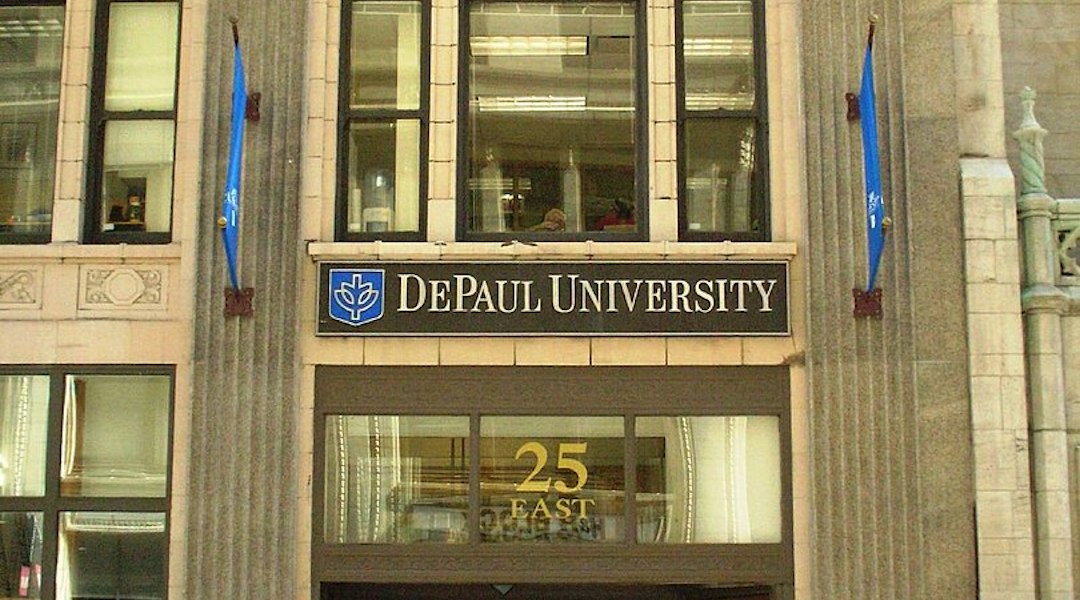CHICAGO (JTA) — I have been a law professor at DePaul University College of Law for several decades. DePaul is an urban, Vincentian, Catholic university that has long been a school of choice for First-Gen students, including law students. As a First-Gen college and law school graduate, I identify with the mission of the school and have always taken great pride in my professional affiliation.
In recent years, people often ask me about the climate at DePaul, specifically in the context of antisemitism facing Jewish students. Personally, I have not encountered any negativity or hostility from any of my students or colleagues, despite being openly Jewish and observant. In fact, several of my Muslim students have talked to me about Judaism and my faith. We have compared notes and shared perspectives.
Still, like almost all universities, DePaul has hopped onto the Diversity, Equity and Inclusion train and that ride often is tone-deaf to antisemitism. At my law school, despite a multitude of DEI trainings over the past several years, not one faculty program dealt with antisemitism or the challenges facing Jewish individuals in our current reality (despite my suggesting we make this a focus of one program). This past summer, another research assistant who was helping me edit a law review article about the Holocaust and “ghetto art” told me that of all the programs required for students focusing on tolerance and inclusivity, not one even touched upon Jews or antisemitism.
Thankfully, however, my law school has been spared the type of ugly incidents that have plagued other law schools such as Berkeley, where student groups pledged to block speakers who held pro-Israel views, and CUNY, where a law student used her graduation speech to denounce Israel and its supporters.
But at DePaul’s undergraduate campus several miles north, things are different. Last December, an article in the Wall Street Journal reported that students at DePaul University “ejected Jewish students who support Israel from clubs and study groups,” citing affected students. When the president of our university communicated to us about this article, he emphasized his desire to fight antisemitism in our community and asked for our input. I wrote to him emphasizing that if schools are funding clubs that exclude students simply because they are pro-Israel, that is a cause for concern unaddressed by his community letter. To my surprise, he never responded to me, even when I sent the letter again a month later. I took note but still wanted to give the benefit of the doubt.
But the university’s communication to us on the Monday after Israel was attacked by Hamas was a wake-up call. Our president and three other high-level administrators opened their message to the DePaul community with the following words: “Our hearts ache to see the horrific violence and tragic loss of life taking place right now in Israel and Gaza. We pray for peace.” Later on, it called for “an immediate de-escalation of the current situation.”
I sat with this grossly inadequate and maddening communication overnight, and the following day I once again reached out to our president to express my deep disappointment with the letter’s failure to call out, and explicitly condemn, the barbaric terrorism perpetrated upon Israel. I pointed out that, by comparison, the university spared no effort in the past in calling out other bad actors in connection with racial and other injustices. In contrast, the university’s pleas for de-escalation in this context not only diminished the suffering of those who were so brutally attacked, but also compounded the pain for Jewish students, staff and faculty, all of whom were already feeling isolated and fragile.
Again, no response. And to the best of my knowledge, none of the other faculty I know who wrote to the president received a response. It is almost as though the entire DePaul Jewish community had become invisible in the academic home I had cherished for so long.
In recent years, higher education in the United States has become the target of well-deserved criticism regarding not only an absence of educational rigor but also a troubling lack of viewpoint diversity in most universities. Too many vitally important conversations on matters involving hotly contested political and cultural issues can only be held behind closed doors rather than in classrooms or at faculty meetings.
But when terrorists kill over 1,400 Jews, the choice to refrain from explicitly condemning those who perpetrated these unimaginable atrocities cannot be justified. I have no clue as to why DePaul, and so many other universities, failed to condemn explicitly the terrorism. Some might attribute it to the academy’s love-affair with the concept of “intersectionality,” which almost always results in a negative stance toward Israel, even if not Jews as a whole. Or could it be just plain old antisemitism dressed up in a more “intellectually respectable” exterior?
Whatever the reason, by making this choice in the wake of Oct. 7, DePaul University has sent a clear message to its Jewish students, faculty, staff and alumni. I can no longer give the benefit of the doubt.
JTA has documented Jewish history in real-time for over a century. Keep our journalism strong by joining us in supporting independent, award-winning reporting.







